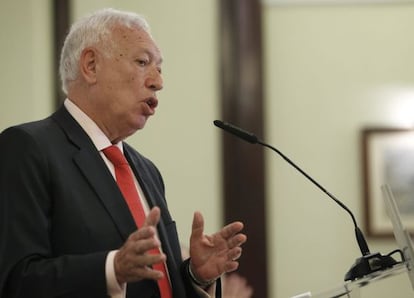Spain may be willing to apologize to Bolivia for Morales’ airspace snub
Austrian daily reports US envoy informed Vienna government that Snowden was on board presidential plane

As the controversy over last week’s European airspace closure refuses to die down, Spanish Foreign Minister José Manuel García-Margallo said Tuesday that he would have no problem “in apologizing” to Evo Morales for the nearly 14-hour delay the fracas caused as the Bolivian President was returning home from an official trip to Moscow.
“If there is any misunderstanding, then, naturally, we will say we are sorry,” Margallo said a day after the Spanish ambassador, along with his counterparts from France, Italy and Portugal, were summoned to the Bolivian Foreign Ministry in La Paz to explain their countries’ actions on July 2.
Speaking at a press breakfast, Margallo did an about-face from his previous position that Spain had no reason to issue an apology.
The presidential plane carrying Morales was prohibited in midair from entering French airspace and had to make an emergency landing in Vienna because it was running out of fuel. Italy and Portugal also closed off their airspace after Spain received a tip-off that Morales was bringing home wanted former US National Security Agency contractor Edward Snowden, who is trying to seek asylum in a South American nation.
Margallo has declined to say who tipped the Spanish government off, but the Vienna daily Die Presse reported on July 3 US Ambassador William Eacho informed the Austrian government that Snowden was on board shortly before Morales’ plane landed.
The United States on Tuesday continued to deny that it had anything to do with the airspace closures, but a State Department spokeswoman reiterated that US relations would be affected with any country offering refuge to Snowden or allowing him transit.
Margallo said the Bolivian foreign minister agreed that the president’s plane could be searched
“I don’t think there’s any secret that we would like to see him returned. We’ve communicated that publicly and privately to any area where he may be stopping in transit, any area where he could possibly end up. So it’s hard for me to see where there would be anybody who’d be confused about where we stand,” said spokeswoman Jen Psaki.
Snowden was reported on Tuesday to have accepted Venezuela's offer of asylum.
Morales had accused the Spanish ambassador in Vienna, Alberto Carnero, of demanding to search the Bolivian presidential plane to ensure that Snowden wasn’t on board.
Meanwhile, protestors gathered on Monday at the US Embassy in La Paz, where American flags were set alight. The Organization of American States (OAS) was expected to take up the issue later Tuesday.
In explaining the chain of events that led to the airspace closures, Margallo said that Bolivian Foreign Minister David Choquehuanca agreed that “if it was necessary” a search of the president’s plane could be carried out to determine if Snowden was on board. Choquehuanca “was very nervous,” according to Margallo, when he called from Panama; he later sent an official letter to the Spanish government denying that Snowden was traveling with Morales.
Reiterating that Spain never closed its airspace to Morales, Margallo said Bolivian officials asked for permission to land in the Canary Islands when the presidential plane was prohibited from making a refueling stop in Portugal. However, Morales later said that Ambassador Carnero tried to condition the technical landing with the demand to search the plane, which the Bolivian leader refused. Nevertheless, Morales was eventually allowed to land in Las Palmas on July 3 as his Falcon jet finally headed toward South America.
Margallo stated that if Snowden had reached Spanish territory, he would have been detained and extradition proceedings would have been initiated. Spain and the United States signed an extradition treaty in 1971, with three supplements approved during the 1990s and early 2000s. Extraditions may not be applicable if the United States cannot guarantee that the wanted fugitive will not face the death penalty.
Tu suscripción se está usando en otro dispositivo
¿Quieres añadir otro usuario a tu suscripción?
Si continúas leyendo en este dispositivo, no se podrá leer en el otro.
FlechaTu suscripción se está usando en otro dispositivo y solo puedes acceder a EL PAÍS desde un dispositivo a la vez.
Si quieres compartir tu cuenta, cambia tu suscripción a la modalidad Premium, así podrás añadir otro usuario. Cada uno accederá con su propia cuenta de email, lo que os permitirá personalizar vuestra experiencia en EL PAÍS.
¿Tienes una suscripción de empresa? Accede aquí para contratar más cuentas.
En el caso de no saber quién está usando tu cuenta, te recomendamos cambiar tu contraseña aquí.
Si decides continuar compartiendo tu cuenta, este mensaje se mostrará en tu dispositivo y en el de la otra persona que está usando tu cuenta de forma indefinida, afectando a tu experiencia de lectura. Puedes consultar aquí los términos y condiciones de la suscripción digital.








































